
The article is a commentary on the topic of fake news and its control, originally published in the Indian Express on February 18, 2023. It explores the challenges associated with fake news and proposes various solutions to tackle the issue.
IMPORTANT FOR ESSAY WRITING : – SEBI Grade A 2023, RBI Grade B 2023 & NABARD Grade A / B 2023
In this internet era, fake news has become a significant social issue that’s causing trouble for us. A fake video depicting an attack on a migrant worker in Tamil Nadu was recently circulated.
According to the National Crime Records Bureau, there has been a 214% rise in the number of cases filed against individuals spreading false news under Section 505 of the Indian Penal Code (IPC) in 2020.
India needs more stringent laws against fake news, and media organisations must make fact-checking a standard practice to raise public awareness.
Challenges in Curbing Fake News in India
Low Digital Literacy, Political Use, Limited Fact-Checking Infrastructure, Lack of Penalties, and Opacity of Social Media Platforms
Low Digital Literacy
India’s low digital literacy rate poses a significant challenge in curbing the spread of fake news. A large portion of the population lacks the skills to verify the authenticity of news sources, and many do not have access to digital services.
Political Use
Fake news is often used for political purposes in India, particularly during elections. Political parties manipulate public opinion using fake news, making it difficult to control its spread.
Limited Fact-Checking Infrastructure
India has limited fact-checking infrastructure, with many small and poorly funded fact-checking organizations.
Lack of Penalties
Opacity of Social Media Platforms
Social media platforms have become the primary ground for public discourse in India. However, the lack of transparency by these platforms makes it challenging to curb the spread of misinformation. The data presented by these platforms is often not in a format that facilitates easy analysis, which further compounds the issue.
Initiatives to Curb Anonymity-based Spread of False Information in India
- Addressing the Challenges of Anonymity in Sharing Information on Social Media
Anonymity and False Information
While anonymity can provide a sense of security for individuals sharing their views online, it also poses a risk of spreading false information without accountability.
Information Technology (Intermediary Guidelines and Digital Media Ethics Code) Rules, 2021
The Information Technology (Intermediary Guidelines and Digital Media Ethics Code) Rules, 2021 proposes the removal of content that has been fact-checked by the Press Information Bureau’s fact check unit and deemed false. This aims to curb the spread of fake news and misinformation on social media platforms.
IT Act 2008
The IT Act 2008 includes Section 66 D, which regulates offences related to electronic communication, and can be used to penalize individuals who spread fake news through electronic communication.
Disaster Management Act 2005
The Disaster Management Act 2005 and the Epidemic Diseases Act 1897 (especially during Covid-19) regulate the circulation of fake news or rumours that can cause panic among citizens.
Indian Penal Code of 1860
The Indian Penal Code of 1860 regulates fake news that causes riots and information that causes defamation. This act can be used to hold individuals accountable for spreading fake news that incites violence or defames someone’s character.
Combating Fake News in India: The Way Forward
Strategies for Promoting Media Literacy and Responsible Journalism, Strengthening Laws, and Encouraging Fact-Checking Organizations and Social Media Companies
Promoting Media Literacy
To combat fake news, people need to be educated and made aware of how to verify sources, fact-check claims, and distinguish between reliable and unreliable news sources.
Strengthening Laws
India has laws against fake news, but they need to be updated and enforced more robustly to address the rapidly evolving online media landscape.
Encouraging Responsible Journalism
Media organizations can promote responsible journalism by adhering to ethical standards and being accountable for their reporting. Fact-checking can also play a role in promoting responsible journalism.
Encouraging Social Media Companies to Act
Social media platforms need to be proactive in identifying and removing fake news. They can use artificial intelligence tools and work with fact-checking organizations to verify news stories.
Encouraging Fact-Checking Organizations
Fact-checking organizations play a critical role in verifying news stories and educating people about fake news. They need to be encouraged and supported by the government and media.
Encouraging Responsible Social Media Use
Individuals need to take responsibility for their social media use by avoiding sharing unverified news stories and being more critical of what they see online.
Fostering a Culture of Critical Thinking
Critical thinking skills need to be fostered in schools and in society in general. People need to question what they read and hear and seek out reliable sources of information.


